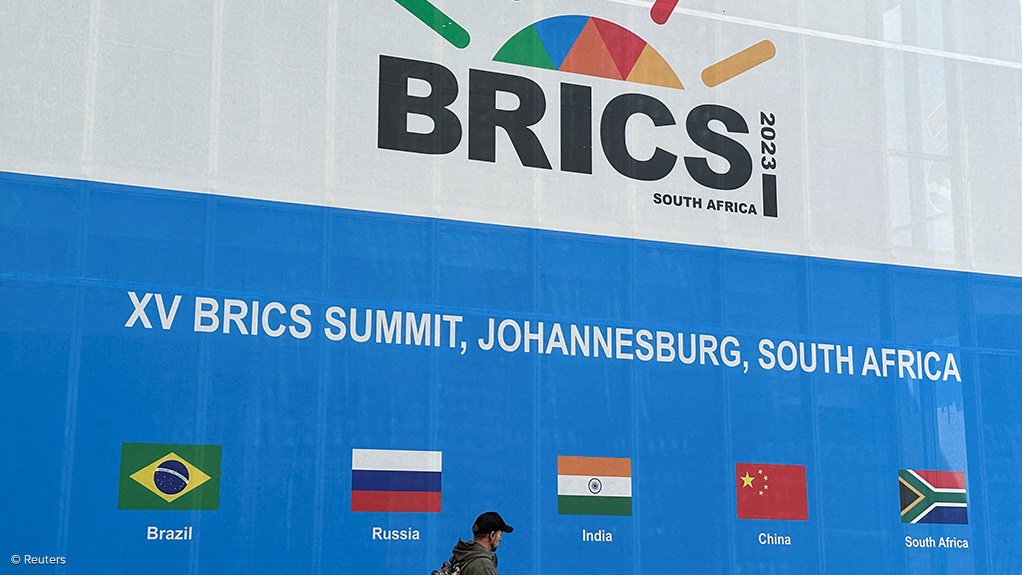The Brazil, Russia, India, China and South Africa (Brics) Summit held last week in Johannesburg was “positive and productive”, with member nations focused on how they can support each other’s development and a rules-based multilateral system, business organisation Business Leadership South Africa (BLSA) CEO Busi Mavuso writes in her weekly newsletter.
“The striking feature of the sessions I attended was the common challenges that the Brics nations face. Ministers from Brazil, India and China spoke of the importance of the energy transition and the need to build the infrastructure to support the growth of their economies and adaptation to climate change.
“They spoke of the importance of trade between the nations and putting in place the right regulations and facilities to achieve it,” she highlights.
Mavuso cites that, in his opening address, Trade, Industry and Competition Minister Ebrahim Patel spoke on the need to facilitate trade that will support inclusive growth in an accelerated but sustainable way.
He said the next wave of global growth was going to come from Africa, given its young and growing population and Brics nations needed to position themselves for it. He also mentioned the importance of the African Continental Free Trade Agreement and entrepreneurship on the continent.
Mavuso avers that these themes are the correct ones to have focused on.
“The fast-growing economies of Brics, leaving aside Russia whose fate is bound up in its own geopolitical issues, do have a great deal to gain from trade with each other. We also have a lot to learn from each other, particularly on how to transition our energy systems and create the infrastructure we need.
“It is important for South Africa that the benefits of such cooperation be focused on enabling its capacity to grow. That is certainly not a threat to the West – a thriving South African economy is something the West would welcome, as a place for investment, trade, tourism and much else,” she says.
“Indeed, the West is important in enabling this – our manufactured goods, in particular, are sold mostly to Western markets. In order for us to build scale, those markets are an important anchor. We need to leverage that to become competitive in ultimately serving fast-growing markets like India and China,” Mavuso posits.
She mentions, however, that the summit was heavy with geopolitical issues and suggests that politicians must address this and business is hopeful that sensible choices will be made in the interests of South Africa.
“One clear theme was the importance of appropriate trade rules that ensure an expanded Brics is not a mechanism for unbalanced trading relationships between the partners. As Brics develops and expands, countries need to be held to a set of rules on how they interact with one another,” Mavuso says.
She adds that President Cyril Ramaphosa did well in his closing remarks to reinforce his commitment to multilateralism and the rule of law, including the United Nations Charter.
He also encouraged multilateral institutions and international organisations to be constructive in building global consensus on economic policies.
“This framing was a careful balance of Brics aspirations and engagement with the West. The politics will need to continue to be managed carefully – the expanded list of 11 members all have their own features and finding common ground will not be straightforward,” she points out.
Mavuso posits that business can do much to support and facilitate the business opportunities that Brics presents.
The expanded Brics, with six developing countries joining, will cover 47% of the world’s population and 37% of its gross domestic product on a purchasing power parity basis.
Given the respective rates of growth, member countries will account for the majority of the world’s population soon, and likely the majority of economic activity in the medium term, she highlights.
“That shows its importance as a trade opportunity for South African business.”
“The New Development Bank is well established and already funding infrastructure projects, which will boost economic development in member countries.
“I think the South African government did well in its hosting of the summit to foreground the economic opportunities and objectives of championing the needs of the people of the Global South. It was a mature strategy that did serve the interests of South Africa. Business can actively support this approach, working for positive outcomes of Brics ones that do not risk critical existing economic relationships,” Mavuso says.
EMAIL THIS ARTICLE SAVE THIS ARTICLE ARTICLE ENQUIRY
To subscribe email subscriptions@creamermedia.co.za or click here
To advertise email advertising@creamermedia.co.za or click here











